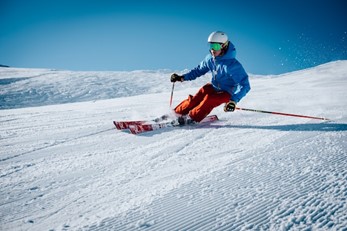
Skiing is not only a thrilling winter sport but also a powerful way to enhance both physical and mental health. As you glide down snow-covered slopes, your body and mind are engaged in ways that contribute to overall well-being. From improving cardiovascular fitness to boosting mental clarity, skiing offers a multitude of health benefits. Tony Cross provides a detailed look at how hitting the slopes can positively impact your physical and mental health.
Physical Health Benefits
Cardiovascular Fitness
Skiing is an excellent cardiovascular workout. Navigating the slopes requires significant energy and effort, which elevates your heart rate and improves cardiovascular endurance. Regular participation in skiing can help:
Strengthen the Heart: Skiing enhances heart function by increasing blood circulation and improving heart muscle efficiency.
Boost Lung Capacity: The aerobic nature of skiing helps to enhance lung function and breathing capacity.
Reduce Risk of Heart Disease: By maintaining a healthy heart and lungs, skiing can lower the risk of developing heart-related conditions.
Muscle Strength and Endurance
Skiing is a full-body workout that targets various muscle groups, including the legs, core, and upper body.
Leg Muscles: Skiing primarily engages the quadriceps, hamstrings, calves, and glutes. The constant motion of bending and straightening your knees strengthens these muscles.
Core Stability: Maintaining balance and controlling movements on the slopes activates the core muscles, enhancing stability and overall strength.
Upper Body: Using ski poles engages the arms, shoulders, and back muscles, providing a comprehensive upper body workout.
Balance and Coordination
Skiing demands precise movements and constant adjustments to maintain balance, which improves overall coordination and proprioception.
Enhanced Balance: Skiers must continuously adjust their body position to navigate the terrain, leading to improved balance and agility.
Better Coordination: The complex movements involved in skiing, such as turning and stopping, enhance coordination between different muscle groups.
Flexibility
Skiing involves a range of dynamic movements that require flexibility. Regular skiing can help to:
Increase Joint Flexibility: The constant motion and varying terrain help to improve the flexibility of the joints, particularly in the hips, knees, and ankles.
Enhance Muscle Flexibility: The repetitive movements involved in skiing stretch and elongate muscles, enhancing overall flexibility.
Mental Health Benefits
Stress Reduction
Being out in nature and engaging in physical activity are both powerful stress relievers. Skiing combines these elements, offering a unique way to reduce stress and improve mental well-being.
Natural Environment: Skiing in the mountains provides a serene and beautiful environment that helps to alleviate stress and promote relaxation.
Physical Activity: The physical exertion involved in skiing releases endorphins, which are natural mood elevators that help to reduce stress and anxiety.
Mental Clarity and Focus
Skiing requires concentration and quick decision-making, which enhances mental clarity and cognitive function.
Improved Focus: Navigating the slopes requires you to stay focused on your movements and surroundings, which can enhance overall concentration skills.
Cognitive Benefits: The mental challenges involved in skiing, such as planning routes and adjusting to changing conditions, stimulate cognitive function and problem-solving abilities.

Emotional Well-Being
Engaging in skiing can boost emotional well-being by promoting a sense of accomplishment and providing opportunities for social interaction.
Sense of Achievement: Successfully skiing down a challenging slope or mastering a new technique can boost self-esteem and provide a sense of accomplishment.
Social Interaction: Skiing is often a social activity, allowing you to bond with friends and family, which enhances emotional health and provides a support network.
Safety and Preparation
To fully enjoy the health benefits of skiing, it’s essential to prioritize safety and preparation.
Proper Equipment
Ensure you have the right equipment that fits well and is appropriate for your skill level. This includes:
Ski Boots and Skis: Properly fitting boots and skis are crucial for safety and performance.
Helmets and Protective Gear: Always wear a helmet and consider additional protective gear to prevent injuries.
Physical Conditioning
Prepare your body for skiing by engaging in regular physical conditioning exercises that enhance strength, flexibility, and endurance. Pre-skiing exercises can include:
Leg Strengthening: Squats, lunges, and leg presses can build leg muscles.
Core Stability: Planks, Russian twists, and other core exercises improve stability.
Cardiovascular Fitness: Running, cycling, and other aerobic exercises can enhance cardiovascular endurance.
Warm-Up and Cool-Down
Always warm up before hitting the slopes and cool down afterward to prevent injuries and enhance recovery.
Warm-Up: Dynamic stretching and light aerobic exercises can prepare your muscles for skiing.
Cool-Down: Stretching and gentle movements post-skiing can aid in muscle recovery and reduce soreness.
Conclusion
Skiing is a multifaceted activity that offers a wealth of physical and mental health benefits. By engaging in this exhilarating sport, you can enhance cardiovascular fitness, build muscle strength, improve balance and flexibility, reduce stress, boost mental clarity, and foster emotional well-being. With proper preparation and safety measures, skiing can be a powerful tool for achieving and maintaining overall health. So, gear up and hit the slopes for a healthier, happier you!